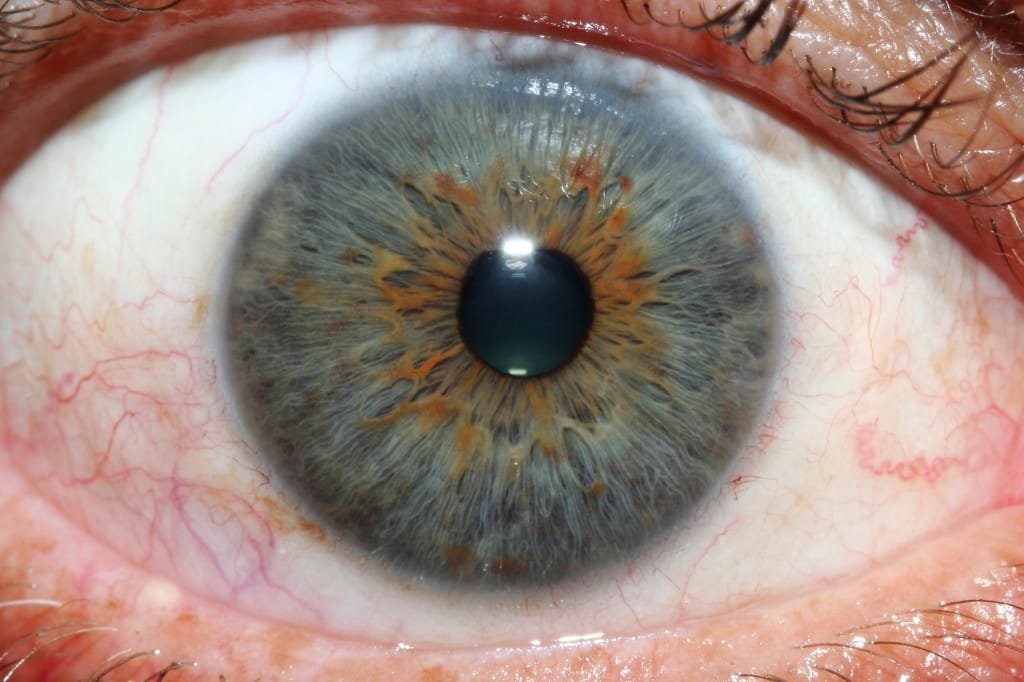what is iridology?

Like reflexology, iridology is based on the principle that the iris, the colored part of the eye, reflects a microcosm of the body. There are no two irises exactly alike; every iris is as unique as a fingerprint. Reading the color and pattern of the iris fibers gives insights into underlying inherent weaknesses passed down through three generations. Iridology is therefore a diagnostic tool used to uncover individual predispositions. Whether health issues develop from these predispositions depends on what you eat and drink, and the way in which you think, live and love.
Iridology is a preventative tool, it can be used an early warning system, and eventually as a gauge for healing and signs of health. The goal of an Iridologist is to help people recognize areas of unconsciousness that manifest as toxic accumulation, and tissue and organ deterioration.
Iridology provides a simple, unobtrusive means of looking into the body. With the information provided, clients are given an opportunity to begin making more conscious decisions regarding lifestyle and eating habits. Disease, germs, viruses’ etc., cannot sustain themselves in a clean pure body. These organisms need toxic bodies with lowered vibrational rates to live in. Iridology provides the visual means to identify weakened and stressed areas of the body where viruses and bacteria have a tendency to dwell and a way monitor healing.

how does it work?
Visual information obtained through the eyes is transmitted energetically to the brain via the nervous system and cellular communication. This same process occurs within the body. Information concerning functioning within the body systems is obtained and transmitted through the nervous system, hormones, ligands, and neurotransmitters to the brain and other cells in the body. The eyes are linked to the inner body by way of the optical nerves, as well as; the cells. In Iridology, the iris of the eye becomes the visual monitor on which information concerning the activity of the tissues is recorded.
With Iridology, information can be obtained through the observation of markings, coloration’s, and fiber patterns, which the Iridologist notes on an eye chart that represents the various systems and organs of the body. The markings and patterns will help the Iridologist determine tissue activity and function in terms of over activity and under activity.
The basis of iridology is a holistic concept well accepted in other fields of alternative medicine, namely that when examined correctly, each part of the body contains information about other parts of the body. In chiropractic medicine, for example, misalignments in the spine are used to diagnose and treat diseases of the internal organs. In Chinese medicine, examinations of the pulse and tongue are regularly included in the diagnostic process. Iridolgists believe that as a degenerative disease slowly develops, the iris will reflect these changes.
Conventional physicians also routinely examine the eye for evidence of internal disease. Using an ophthalmoscope to look at the retina of the eye, a doctor can see how diseases such as diabetes or high blood pressure are affecting blood vessels. Likewise, a close examination of the iris can give information about high cholesterol and certain metabolic ailments.

Iridologists contend that conventional physicians woefully underutilize the iris as a source of information about an individual’s health status. They point out that the iris itself is one of the most complex organs in the human body. When a photograph of the iris is enlarged, iridologists claim they can get a view of an ultrafine membrane of connective tissue that shows signs of degenerative diseases well before their presence is manifested in larger organs.
Over the years, many iridology texts have “mapped” segments of the iris to correspond with various internal organs. While this concept is accepted by most American-trained iridologists, it continues to be debated among European practitioners. Although the European iridologists believe that analysis of the eye can indicate a propensity for disease, they point to the lack of evidence for any anatomical correspondence between sections of the iris and specific body parts.
Most American-trained iridologists, however, continue to maintain that the iris is connected to the brain and acts as a control panel, giving readouts on conditions in the various parts of the body. Because thousands of nerve endings make up the iris, they contend, the eye can indeed provide a system of connections to the rest of the body.
iridology camera



iridology images





How to use the Maikong iridology software
What is iridology Video let you know





















